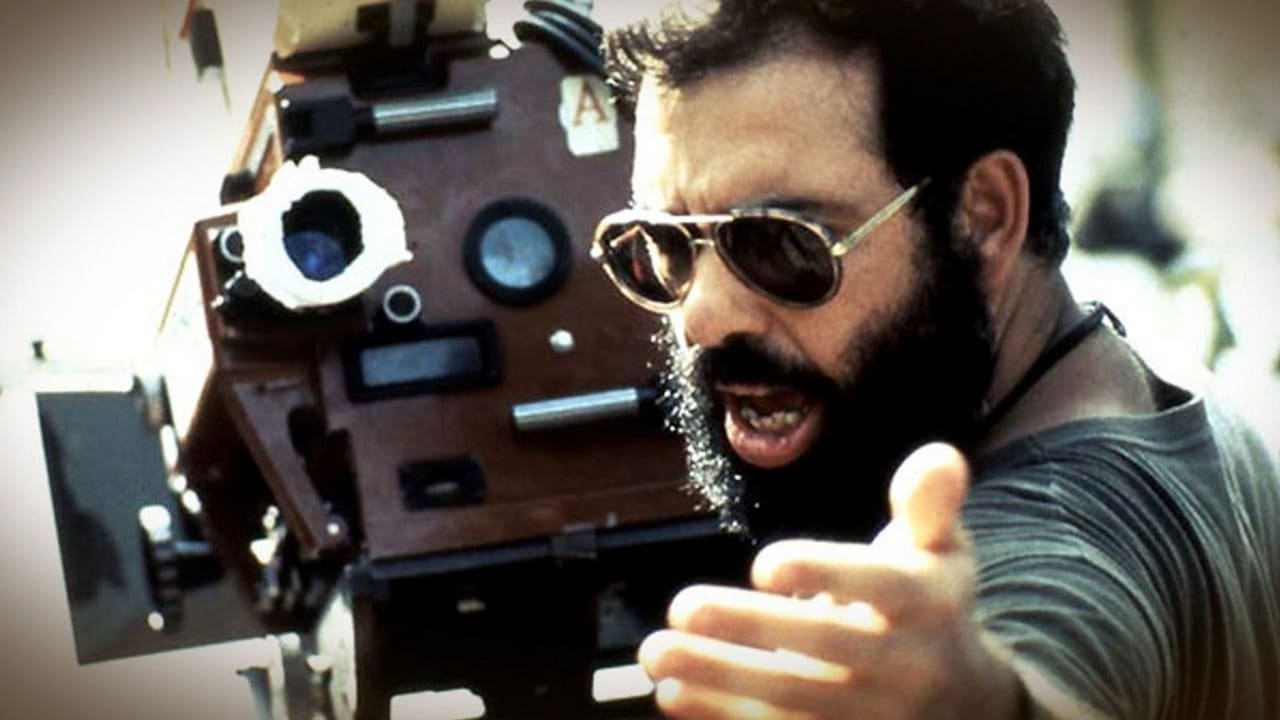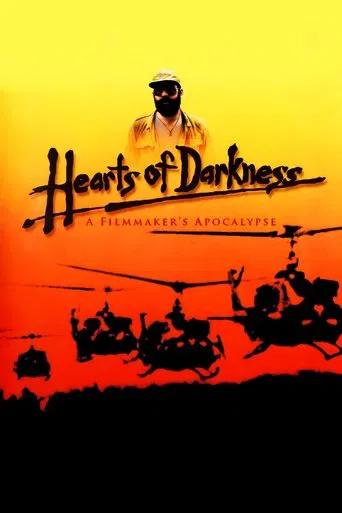

It is neither dumb nor smart enough to be fun, and spends way too much time with its boring human characters.
... View MoreThere's a more than satisfactory amount of boom-boom in the movie's trim running time.
... View MoreOne of the most extraordinary films you will see this year. Take that as you want.
... View MoreThrough painfully honest and emotional moments, the movie becomes irresistibly relatable
... View MoreReleased in 1991, "Hearts of Darkness: A Filmmaker's Apocalypse" chronicles the making of 1979's "Apocalypse Now," combining footage shot by Eleanor Coppola during the shooting of the film with more recent interviews with the cast & crew.Documentaries or commentaries on how a particular film was made don't interest me because I'm not a filmmaker and only care about the final product. As a writer and former musician I'm familiar with the creative process and understand how some ideas fail to deliver the goods and must be thrown out, etc. As an example, I heard some demos of a couple of my favorite songs and they were lousy compared to the final product and almost ruined my view of those songs. This explains why I'm generally not interested in the harrowing details of how my favorite movies were made and the parts that were thrown out, etc. This documentary is an exception because (1.) "Apocalypse Now" is my all-time favorite movie (the original theatrical version, that is) and (2.) the documentary is just so well-done. In fact, it's fascinating from beginning to end."Hearts of Darkness" shows the monumental problems Coppola and crew encountered in making the movie: The sudden firing of their leading man (Harvey Keitel) after three weeks of shooting and replacing him with Martin Sheen; the delays in filming due to the Philippine Army taking back their rented helicopters to quell an uprising; a hurricane that ruins the sets; Sheen having a heart attack at only 36 years of age and the corresponding delay; overweight Brando arriving to the set totally unprepared and making $1 million a week with an unwritten, improvised ending; the amusing tiger incident; Francis venting in genuine uncertainty at various stages of the creative process, particularly the entire ending; etc.The interviews with cast and crew are also very informative and entertaining, like Frederic Forrest's commentary on the tiger sequence and John Milius' insights on his original screenplay and his encounter with Francis during filming where the latter convinced him that it'd be "the first film to win the Nobel prize." This documentary came out ten years before the "Redux" version of the film was released and, as such, it was the public's first glimpse of various scenes that ended up on the cutting room floor, like the French Plantation sequence and the typhoon-with-the-bunnies sequence. In my opinion, "Redux" is a failure and those scenes should've never been inserted into the movie as very little of the added footage works, but those sequences ARE interesting as deleted scenes or viewing them (in part) in the context of "Hearts of Darkness." For some good laughs, be sure to check out the spoof of this documentary: "Hearts of Hot Shots Part Deux: A Filmmaker's Apology," which was released in 1993 and is available on Youtube in a couple parts.The film runs 96 minutes.GRADE: A
... View More"Hearts of Darkness" is a documentary chronicling the making of "Apocalypse Now". The title is a variation on the novel "Heart of Deakness" by Joseph Conrad--a book that was the basis for much of the film.This documentary gives extraordinary insight into the filming of "Apocalypse Now" because instead of making the documentary way after the fact like most 'making of' films, Coppola's wife was filming behind the scenes throughout the film shoot. It's surprising, then, that it took so long for this documentary to come to light. I think it is clearly a testament to the cult-like adoration of "Apocalypse Now" by some devoted fans.Some highlight of the film include: Laurence Fishburne's comments about 'how fun the war must have been'. These were incredibly stupid and naive, but you do need to remember that he was only 14--a little kid playing a man. So, to him it might have seemed that way when he made the film.Dennis Hopper was clearly 'hopped up' during the filming. His use of drugs is no bit surprise and here you get to see him in all his flaky splendor.Watching the documentary, it's amazing that the finished film was any good. Marlon Brando, despite receiving a MASSIVE salary to participate, wasn't the least bit prepared. Much of what they filmed with him was gibberish and it was all pieced together months later to try to make a coherent ending.You really cannot watch this documentary without first watching movie.My feeling about all this is that the film, though it has some interesting moments, is NOT a must-see film unless you absolutely adore the film. Otherwise, you'll probably be a bit bored by it after a while--which I was.
... View MoreNever before has a documentary so closely been able to capture the spontaneity, the ambition, the determination needed to make a movie. It is a well-known fact that Apocalypse Now, Francis Ford Coppola's epic tale of the chaos and confusion surrounding America's involvement in the Vietnam War, was at first glance a financial and monumental disaster. It took almost twice as long to shoot as expected, went way over budget and Coppola had numerous problems with actors and in writing the script. Yet, 30 years later, we look at this film and it is quite simply perfect. How could this be and what is it that drove Coppola to make this movie despite all outside forces against him? These questions are what is at the center of this fascinating documentary shot by Coppola's own wife, Eleanor. Shot without her husband's awareness, we get the full and unedited explanation of why things went so bad. Bad luck, bad weather and just plain bad results led to the debacle Coppola found himself in; driving so close as to contemplate suicide. In-depth interviews with many of the cast and crew reveal even more. But at the heart of this documentary, the film Apocalypse Now, and the career of Francis Ford Coppola, is a desire.He mentions it several times; he always had the desire and ambition to go as far as he could, to make a great movie and not just make money. He put up all the money he had to make this one, a personal journey and one that very well may be the highlight of his career. Looking at movies today, I realize that this is what makes Coppola such a great filmmaker and auteur. He has that ambition and desire to go way above and beyond what most other directors do. No movie studio would even dare make another Apocalypse Now today because it is too incredible for their own good. One of the very last great filmmakers of all time, watching this documentary is an account of a personal journey of Coppola into the real heart of darkness: fear and anxiety that he would make a forgettable and deplorable movie. Thank God he did not.
... View MoreHearts Of Darkness glosses over one of the more important aspects of the film's creation, the hiring and firing of the first actor, Harvey Keitel, to portray Lt. Willard. We are simply told it was not working, and cut to Francis's hiring of Martin Sheen. But, we never see any of the footage shot with Keitel, we never learn if he was simply too different from Francis's vision of Willard to work, or was he simply doing a poor job, a malcontent, or clashing too frequently with Francis. For a so-called documentary to leave such wide open says much of the aims of the documentarian, in this case Eleanor. Also left open-ended is a much talked about aspect of the filming that the documentary does not cover, and that is Francis's infidelity on the set, and how that contributed to the distance between the couple. How this affected Eleanor's documentary, much less Apocalypse Now, is certainly ripe for discussion. This is the rare instance where such is not mere gossip for gossip's sake, but pertinent information about the director's state of mind in the improvisatory aspects of the film. Was his film more gloomy because of the infidelity's consequences? Hearts Of Darkness does a great disservice to its viewers by totally avoiding such questions, even as it claims a rare intimacy, due to Eleanor's claim to have surreptitiously recorded conversations without Francis's knowledge.Overall, the DVD package is barely worth an investment, especially if a Coppola fan, but once again the studio that put out the DVD could have offered so much more for so little an investment. Hearts Of Darkness: A Filmmaker's Apocalypse is a good and worthwhile 'Making Of' feature for a DVD release, but, as a stand alone documentary, it is rather lacking. Thus, with two making of documentaries, and no real feature, the package is saved by the aforementioned pluses alone. Better than nothing, but most viewers will wind up asking, 'Well, that's it?''Tis.
... View More